Awards for Scholarly Distinction
In 1984 the Council of the American Historical Association established the American Historical Association Award for Scholarly Distinction. Each year a nominating jury, composed of the president, president-elect, and immediate past president, recommends to the Council of the Association up to three names for the award. Nominees are senior historians of the highest distinction in the historical profession who have spent the bulk of their professional careers in the United States. Previous awards have gone to Nettie Lee Benson, Woodrow Borah, Alfred D. Chandler Jr., Thomas D. Clark, David Brion Davis, Angie Debo, Martin Duberman, Helen G. Edmonds, Elizabeth Eisenstein, Saul Friedländer, Lloyd Gardner, Peter Gay, Felix Gilbert, Jack P. Greene, John Whitney Hall, Tulio Halperín-Donghi, Joseph E. Harris, John Higham, H. Stuart Hughes, Margaret Atwood Judson, Michael Kammen, Nikki R. Keddie, George F. Kennan, Paul Oskar Kristeller, Gerhart B. Ladner, Gerda Lerner, Lawrence W. Levine, Leon Litwack, Wallace T. MacCaffrey, Ramsay MacMullen, Ernest R. May, Arno J. Mayer, Richard P. McCormick, August Meier, Edmund Morgan, George L. Mosse, Robert O. Paxton, John G. A. Pocock, Earl Pomeroy, H. Leon Prather Sr., Benjamin Quarles, Edwin O. Reischauer, Robert V. Remini, Nicholas V. Riasanovsky, Caroline Robbins, Arthur M. Schlesinger Jr., Carl E. Schorske, Anne Firor Scott, Joan Wallach Scott, Benjamin I. Schwartz, Kenneth M. Setton, Nancy G. Siraisi, Kenneth M. Stampp, Chester G. Starr, Barbara and Stanley Stein, Fritz Stern, Lawrence Stone, Sylvia L. Thrupp Strayer, Merze Tate, Emma Lou Thornbrough, Brian Tierney, David Underdown, Eugen Weber, Gerhard Weinberg, and George R. Woolfolk.
Joining this distinguished list are Susan Naquin (Princeton Univ.) and Peter Stanksy (Stanford Univ.).
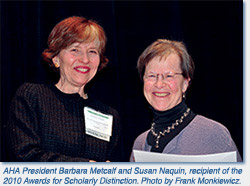 Susan Naquin’s contributions to Qing history have been consistent, remarkably original, close to the sources, and unfailingly insightful. Her scholarship uses abundant archival sources in order to describe the role of popular religious practice among ordinary Chinese. Her first book, Millenarian Rebellion in China: The Eight Trigrams Uprising of 1813 (1976), used sources from the newly opened archives of mainland China, especially depositions obtained from captured rebels. She discussed the Buddhist scriptures that inspired the rebels, the use of family and disciple connections to extend the sect networks, the devotional practices of the sects, and the factors leading to the outbreak of rebellion in fascinating detail. This is still the best study of a popular rebellion in China for its vivid narrative drive and its analytical clarity.
Susan Naquin’s contributions to Qing history have been consistent, remarkably original, close to the sources, and unfailingly insightful. Her scholarship uses abundant archival sources in order to describe the role of popular religious practice among ordinary Chinese. Her first book, Millenarian Rebellion in China: The Eight Trigrams Uprising of 1813 (1976), used sources from the newly opened archives of mainland China, especially depositions obtained from captured rebels. She discussed the Buddhist scriptures that inspired the rebels, the use of family and disciple connections to extend the sect networks, the devotional practices of the sects, and the factors leading to the outbreak of rebellion in fascinating detail. This is still the best study of a popular rebellion in China for its vivid narrative drive and its analytical clarity.
In Shantung Rebellion: The Wang Lun Uprising of 1774 (1981), she again used depositions and other sources, finding illuminating details about the rebel leader, Wang Lun. Displaying her skeptical temper and cautious stance toward glib generalization, she showed that popular theoretical paradigms about rebellion simply do not work in this case. Her coauthored work with Evelyn Rawski, Chinese Society in the Eighteenth Century (1987), was a pioneering synthetic work pointing to the active commercialization and regional growth in 18th century China. With Yü Chün-fang, she collaborated on a conference volume, Pilgrims and Sacred Sites in China (1992), which broke open new territory, showing that Chinese pilgrims visited many sacred sites as part of their regular religious activity. This study comes as close as a historian can come to giving us the insiders’ view of religious practice.
Her great, encyclopedic study, Peking: Temples and City Life, 1400–1900 (2000), crowned her active career with an amazingly detailed and profound exploration of religious institutions in the capital city. Once again, popular religion revealed significant social activities in temples as public spaces beyond the state’s control. This is not a storytelling book like her first two, but an analytic account of the collective life of a large community. She achieves the rare unity of large scale, long time period, and individual depth that we all hope to achieve. With this work, and her many other distinguished contributions over three decades, she well deserves this honor.
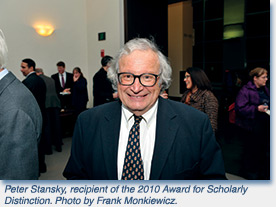 For four decades, Peter Stansky, the Frances and Charles Field Professor of History at Stanford University, has shaped the field of modern British history. From Ambitions and Strategies: The Struggle for the Leadership of the Liberal Party in the 1890s (1964) to The First Day of the Blitz (2007), his scholarly production has been remarkable for its volume, range, and significance. Including the books he edited or those he co-authored with William Abrams, his scholarship addresses many of the main themes of modern British history: the dissipation of the Liberal and growth of the Labour parties; the rise of aesthetic modernism (and the central role played by the Bloomsbury Group); the impact of two world wars and the Spanish Civil War on British intellectuals; and postwar manifestations of an “austere,” “swinging,” and “cool” Britain. Central to all of this work is an abiding interest in the continuities and changes within British political culture, and a dedication to reconstructing the past with compassion and humanity.
For four decades, Peter Stansky, the Frances and Charles Field Professor of History at Stanford University, has shaped the field of modern British history. From Ambitions and Strategies: The Struggle for the Leadership of the Liberal Party in the 1890s (1964) to The First Day of the Blitz (2007), his scholarly production has been remarkable for its volume, range, and significance. Including the books he edited or those he co-authored with William Abrams, his scholarship addresses many of the main themes of modern British history: the dissipation of the Liberal and growth of the Labour parties; the rise of aesthetic modernism (and the central role played by the Bloomsbury Group); the impact of two world wars and the Spanish Civil War on British intellectuals; and postwar manifestations of an “austere,” “swinging,” and “cool” Britain. Central to all of this work is an abiding interest in the continuities and changes within British political culture, and a dedication to reconstructing the past with compassion and humanity.
Stansky’s significance as a scholar and teacher was captured in 2000, when Fred Leventhal and George Behlmer published an edited collection of essays in his honor. Singular Continuities: Tradition, Nostalgia, and Identity in Modern British Culture displays the wide range of influence Stansky has had on three generations of students of British political culture. His most significant legacy is his fostering of intellectual independence both in terms of subject matter and methodology. This approach informs his scholarship as well, for his published work attempts to represent the past in all its complexity, and is characterized by a spirit of tolerance and often bemusement.
Stansky’s influence extends far beyond those individuals fortunate enough to have been his graduate students at Stanford University over the last 40 years. His great talent in the field has been to connect people to one another on the basis of common interests. Both his publications and his active engagement in the profession have contributed to his very great influence on the wider field of British history.
Troyer Steele Anderson Prize
At its December 27, 1963 meeting, the AHA Council established this prize endowed by a bequest from Frank Maloy Anderson, a longtime AHA member. The prize was to be awarded every ten years beginning in 1970 to the person whom the Council of the Association considered to have made an outstanding contribution to the advancement of the purposes of the Association during the preceding ten years. In 1990, the Council and the Professional Division reviewed the history of the prize and approved several recommendations, including awarding the prize at least every five years to recognize service to the profession. More recently, the Professional Division agreed to award the prize on a regular basis to honor AHA members’ contributions to the Association.
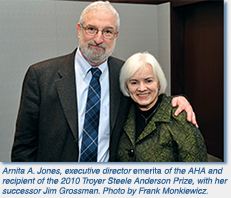 The tenth honor was awarded to Arnita A. Jones, executive director emerita of the American Historical Association.
The tenth honor was awarded to Arnita A. Jones, executive director emerita of the American Historical Association.
For more than two decades, Arnita Jones has carried the title and burden of an executive director for history. From 1988 through 1999 she was executive director of the Organization of American Historians and from 1999 until August 2010 she was executive director of the American Historical Association. No other person has ever held these two posts, and it is unlikely that anyone ever will.
At both the OAH and the AHA, Arnita Jones was a vigorous proponent for the community of historians in a wide range of institutions. She has been particularly interested in improving the teaching of history at the K–12 level; she has been a force for improving the conditions for part-time faculty; she worked to involve community college historians in the associations. A historian of modern Germany, she successfully fostered international participation in the AHA, working with the International Committee of Historical Sciences to forge links with colleagues around the world.
Arnita Jones was the first director of the National Coordinating Committee for the Promotion of History, today’s National Coalition for History, setting it on its influential course. She was a founding member and chair of the National Council on Public History, the president of the Southern Association of Women Historians, and a founding member of the Society for History in the Federal Government. She has served on the boards and steering committees of most of the important history and humanities organizations in the United States.
Truly the entire American historical profession has been strengthened and shaped by Arnita Jones’ stable, enduring guidance. In recognition of her leadership and exceptional contributions, the American Historical Association proudly awards Arnita Jones the Troyer Steele Anderson Prize and names her executive director emerita of the American Historical Association.
Eugene Asher Distinguished Teaching Award
Established in 1986, the Eugene Asher Distinguished Teaching Award recognizes outstanding teaching and advocacy for history teaching at two-year, four-year, and graduate colleges and universities, by commending an inspiring teacher whose pedagogical techniques and mastery of subject matter make a lasting impression and substantial difference to students of history. The prize is named for the late Eugene Asher who was for many years a leading advocate for history teaching. The Society for History Education (SHE) shares with the AHA sponsorship of the award. Members of the AHA and SHE submit nominations to the Committee on Teaching Prizes.
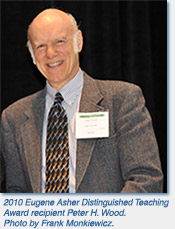 The 2010 honoree is Peter H. Wood, emeritus professor of history at Duke University. Professor Wood encourages his students “to imagine broadly and dig deeply” to make personal connections with the past. Using this approach, he has had a profound impact on his students’ lives, historical interests, and thinking. One student has noted Professor Wood’s gift for asking soft-spoken questions that “turned our assumptions upside down.” Along with distinguished service to his school, he has brought history to a larger audience through his public presentations, community service, documentaries, and publications.
The 2010 honoree is Peter H. Wood, emeritus professor of history at Duke University. Professor Wood encourages his students “to imagine broadly and dig deeply” to make personal connections with the past. Using this approach, he has had a profound impact on his students’ lives, historical interests, and thinking. One student has noted Professor Wood’s gift for asking soft-spoken questions that “turned our assumptions upside down.” Along with distinguished service to his school, he has brought history to a larger audience through his public presentations, community service, documentaries, and publications.
Beveridge Family Teaching Award
Established in 1995, this prize honors the Beveridge family’s long-standing commitment to the AHA and to K-12 teaching. Friends and family members endowed this award to recognize excellence and innovation in elementary, middle, and secondary school history teaching, including career contributions and specific initiatives. The individual can be recognized either for individual excellence in teaching or for an innovative initiative applicable to the entire field. It is offered on a two-cycle rotation: in even-numbered years, to an individual; in odd-numbered years, to a group. The prize was first offered in 1996, and in 2010 was awarded to a group of history teachers.
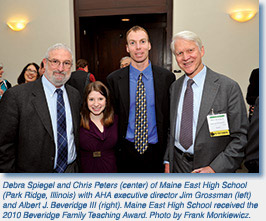 President-elect Grafton announced that the fifteenth recipient of the Beveridge Family Teaching Prize is Maine East High School in Park Ridge, Illinois. Serving an academically challenged student body, Maine East High has developed an impressive, innovative program to teach students the skills necessary for success in high school and college, with a particular emphasis on reading and writing. Using a well-crafted, interdisciplinary approach that combines a variety of fictional and historical sources, their program promotes student engagement, self-reflection, and critical thinking. Additionally, students learn to create and effectively defend their arguments, both in discussion and in writing.
President-elect Grafton announced that the fifteenth recipient of the Beveridge Family Teaching Prize is Maine East High School in Park Ridge, Illinois. Serving an academically challenged student body, Maine East High has developed an impressive, innovative program to teach students the skills necessary for success in high school and college, with a particular emphasis on reading and writing. Using a well-crafted, interdisciplinary approach that combines a variety of fictional and historical sources, their program promotes student engagement, self-reflection, and critical thinking. Additionally, students learn to create and effectively defend their arguments, both in discussion and in writing.
Raymond J. Cunningham Prize for the Best Article by an Undergraduate
Awarded for the first time in 2010, the Cunningham Prize honors the best article written by an undergraduate student published in a history department journal. This annual prize was established in memory of Raymond J. Cunningham, who was an associate professor of history at Fordham University and an authority on American historian Herbert Baxter Adams. Each history department journal may nominate one article, and the winning author and the winning journal each receive a cash prize.
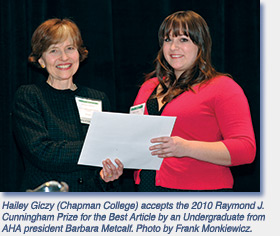 The first honoree is Hailey Giczy, 2009 graduate of Chapman University, for her article “The Bum Blockade: Los Angeles and the Great Depression,” published in Voces Novae: Chapman University Historical Review (vol. 1, no. 1, 2009, pp. 97–121).
The first honoree is Hailey Giczy, 2009 graduate of Chapman University, for her article “The Bum Blockade: Los Angeles and the Great Depression,” published in Voces Novae: Chapman University Historical Review (vol. 1, no. 1, 2009, pp. 97–121).
With thorough research about the efforts of the Los Angeles Chief of Police to block “Okies” from entering the city in 1936, this article argues how the social upheaval and displacement of the Great Depression altered frontier culture. The prize committee notes that this sophisticated article, drawn from impressive primary sources and significant archival materials, offers an original and creative analysis of an understudied aspect of California history and connects it to the broader trends in United States history. The article is well deserving of the first Cunningham Prize.
Equity Awards
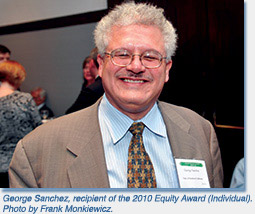 In 1996, the American Historical Association adopted a statement on equity that acknowledges its commitment “to diversity in the historical profession” and called on “institutions to recruit aggressively and hire members from groups that have been historically discriminated against.”
In 1996, the American Historical Association adopted a statement on equity that acknowledges its commitment “to diversity in the historical profession” and called on “institutions to recruit aggressively and hire members from groups that have been historically discriminated against.”
To further these goals, the AHA has established two equity awards to be conferred annually: one for individuals and another for academic units. The awards are meant to recognize and publicize individuals and institutions that have achieved excellence in recruiting and retaining underrepresented racial and ethnic groups into the historical profession, and can recognize new initiatives or sustained efforts.
George Sanchez (Univ. of Southern California) received the Individual Equity Award. Throughout his career, George Sanchez has committed himself to making the historical profession more diverse and equitable. From his recruitment and mentoring of students of color and first-generation college students in graduate programs to his program-building in American studies and ethnicity at the University of Southern California, from his civically engaged scholarship to his development of the Center for Diversity and Democracy, Sanchez has had a tremendous impact on the academy.
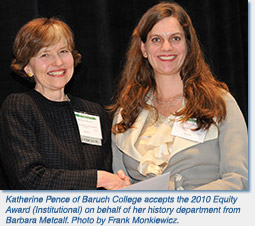 The History Department of Baruch College in the City University of New York received the Institutional Award. Situated in New York City, this department is recognized for its exceptional and sustained efforts to create a vibrant intellectual environment that advances the recruitment and retention of faculty from racial and ethnic groups underrepresented within the historical profession. This department’s unwavering commitment to faculty diversity has paved the way for a membership, curriculum, and student life that is reflective and supportive of the dynamic diversity of its college’s student body.
The History Department of Baruch College in the City University of New York received the Institutional Award. Situated in New York City, this department is recognized for its exceptional and sustained efforts to create a vibrant intellectual environment that advances the recruitment and retention of faculty from racial and ethnic groups underrepresented within the historical profession. This department’s unwavering commitment to faculty diversity has paved the way for a membership, curriculum, and student life that is reflective and supportive of the dynamic diversity of its college’s student body.
Herbert Feis Award for Distinguished Contributions to Public History
Established in 1984, this prize is offered annually to recognize distinguished contributions to public history during the previous 10 years. The prize is named in memory of Herbert Feis (1893–1972), public servant and historian of recent American foreign policy, with an initial endowment from the Rockefeller Foundation. The prize was originally given for books produced by historians working outside of academe. From 2006, the scope of the award is widened to include other types of public history work.
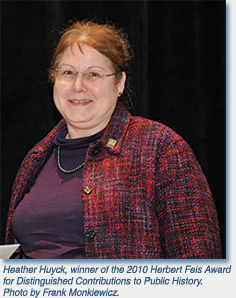 The terms of the award now define both “contribution” and “public history” broadly. Contributions could, for example, include work as the administrator of a public history group or agency (such as a historical society, a historic site, or a community history project) or as the creator or producer of a public history product or products (such as a museum exhibit, radio script, web site, oral history collection, or film). Often, the contribution will be the result of years of effort in the field, but the prize can also recognize a singular contribution of major importance such as a pathbreaking museum exhibit. Public history is defined as work primarily directed at non-academic, non-school-based audiences. Those audiences could be very broad (e.g., television viewers) or highly specialized (e.g., policymakers). Although the audience is primarily outside of academia, the recipient of the award can be employed at a university.
The terms of the award now define both “contribution” and “public history” broadly. Contributions could, for example, include work as the administrator of a public history group or agency (such as a historical society, a historic site, or a community history project) or as the creator or producer of a public history product or products (such as a museum exhibit, radio script, web site, oral history collection, or film). Often, the contribution will be the result of years of effort in the field, but the prize can also recognize a singular contribution of major importance such as a pathbreaking museum exhibit. Public history is defined as work primarily directed at non-academic, non-school-based audiences. Those audiences could be very broad (e.g., television viewers) or highly specialized (e.g., policymakers). Although the audience is primarily outside of academia, the recipient of the award can be employed at a university.
For exemplary contributions to public history as National Park Service historian, planner, and legislative specialist; as facilitator of strengthened collaboration between public and academic historians; as leading advocate for the interpretation of women’s history at public sites; and as teacher and mentor of future historians, the Association is pleased to present the 2010 Feis Award to Heather Huyck, College of William and Mary.
John E. O’Connor Film Award
In recognition of his exceptional role as a pioneer in both teaching and research regarding film and history, the American Historical Association established this award in honor of John E. O’Connor of the New Jersey Institute of Technology. The award seeks to recognize outstanding interpretations of history through the medium of film or video. Essential elements are stimulation of thought, imaginative use of the media, effective presentation of information and ideas, sensitivity to modern scholarship, and accuracy. The production should encourage viewers to ask questions about historical interpretations as well as make a contribution to the understanding of history.
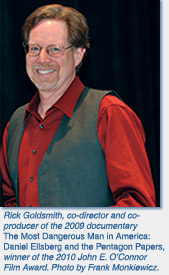 The O’Connor Award was presented to The Most Dangerous Man in America: Daniel Ellsberg and the Pentagon Papers, produced and directed by Judith Ehrlich and Rick Goldsmith. This stimulating documentary film has a clear point of view and remarkable contemporary relevance. The narrator, Ellsberg himself, brings together the web of inferences that connects him with his time and his changing views on the Vietnam War and the highest political leadership of his country. The authors allow critical thoughts to be developed and expressed, whereas rich visual and sound archives seamlessly present a wealth of information on complex historical events and ideas.
The O’Connor Award was presented to The Most Dangerous Man in America: Daniel Ellsberg and the Pentagon Papers, produced and directed by Judith Ehrlich and Rick Goldsmith. This stimulating documentary film has a clear point of view and remarkable contemporary relevance. The narrator, Ellsberg himself, brings together the web of inferences that connects him with his time and his changing views on the Vietnam War and the highest political leadership of his country. The authors allow critical thoughts to be developed and expressed, whereas rich visual and sound archives seamlessly present a wealth of information on complex historical events and ideas.
Nancy Lyman Roelker Mentorship Award
In recognition of Nancy Lyman Roelker’s role as a teacher, scholar, and committee member of the historical profession, and on the occasion of her 75th birthday, friends, colleagues, and former students established the Nancy Lyman Roelker Mentorship Award. The annual award recognizes and encourages a special quality exemplified by Professor Roelker through the human component in her teaching of history.
Mentoring should encompass not only a belief in the value of the study of history but also a commitment to and a love of teaching it to students regardless of age or career goals. Advising is an essential component, but it also combines a consistent personal commitment by the mentor to the student as a person. Offering a human alternative, frequently in quiet and unacknowledged ways, mentors like Professor Roelker believe that the essence of history lies in its human scope. With this award, the American Historical Association attests to the special role of mentors to the future of the historical profession.
The award is given on a three-cycle rotation to graduate, undergraduate, and secondary school teacher mentors. Nominations for the 2010 prize were for a precollegiate mentor. Christopher Dean Lee, Zephryhills High School, Zephryhills, Florida, is the recipient of the Roelker Mentorship Award. His students appreciated Lee’s willingness to give extra time to them to assure their educational success. While mentoring his students, Mr. Lee also completed the rigorous process involved in earning recognition as a National Board Certified teacher. He also founded his school’s social studies society. Clearly, his students learned a great deal about history, but several wrote to say that he teaches “about both history and life, about hard work and hard knocks.”
Roy Rosenzweig Prize for Innovation in Digital History
The Roy Rosenzweig Fellowship for Innovation in Digital History is sponsored jointly by the AHA and the Center for History and New Media at George Mason University. This nonresidential fellowship is awarded annually to honor and support work on an innovative and freely available new media project, and in particular for work that reflects thoughtful, critical, and rigorous engagement with technology and the practice of history. The fellowship is conferred on a project that is either in a late stage of development or which has been launched in the past year but is still in need of further improvements. Committee members representing the AHA and George Mason University are Daniel Cohen (George Mason Univ.), chair; Stephen Brier (Graduate Center, City Univ. of New York); Michael O’Malley (George Mason Univ.); Jan Reiff (UCLA); and Stefan Tanaka (Univ. of California, San Diego).
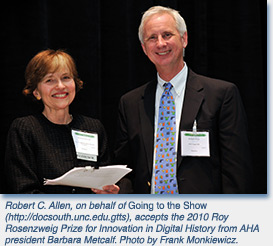 The 2010 Roy Rosenzweig Prize was awarded to Going to the Show, http://docsouth.unc.edu/gtts; Scholarly Advisor: Robert C. Allen, University of North Carolina at Chapel Hill; Principal Investigator: Natasha Smith; Project Managers: Elise Moore (2008–09) and Adrienne MacKay (2007–08).
The 2010 Roy Rosenzweig Prize was awarded to Going to the Show, http://docsouth.unc.edu/gtts; Scholarly Advisor: Robert C. Allen, University of North Carolina at Chapel Hill; Principal Investigator: Natasha Smith; Project Managers: Elise Moore (2008–09) and Adrienne MacKay (2007–08).
Combining cutting-edge technology with little-known historical resources, Going to the Show opens the experience of movie going in North Carolina during the age of the nickelodeon and Jim Crow. The site overlays the social and spatial by prodding the viewer to rethink the history of a modern art form and consider scholarly questions on race and class in the South. The site blends visual and written evidence, presented in an attractive, interactive, user-friendly fashion.
Honorary Foreign Member
At its second annual meeting in Saratoga in 1885, the newly appointed Committee on Nominations for Honorary Membership selected Leopold von Ranke as the first honorary foreign member of the AHA. In the intervening 115 years, only 93 individuals have been so honored. Commencing in 1991, one annual selection is made honoring a foreign scholar who is distinguished in his or her field of history and who has notably aided the work of American historians.
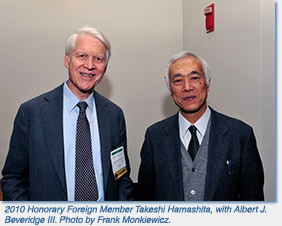 President-elect Grafton announced the selection of Takeshi Hamashita, director, Institute of Oriental Culture, University of Tokyo, as the newest honorary foreign member, and read the following citation: “Perhaps the most accomplished Asian historian of Asia, Takeshi Hamashita is a scholar of utmost humility and integrity even while he has never hesitated to speak his mind in matters of importance to him. He has tucked away his massive publication record and enormous leadership role in Asian studies in Japan in a most sparse curriculum vitae. As professor and director of the Institute of Oriental Culture, the University of Tokyo, Hamashita was not only the leading Sinologist and Asianist within Japan, but also hosted and, often personally, helped dozens of American and foreign scholars visiting Japan to study Chinese and inter-Asian history. Hamashita’s lifelong contribution has been in the area of maritime trade of East Asia, linking the South China Sea to the Pacific and, more recently, the Indian Oceans. He has argued that this trade was as vibrant as any other regional trade in the world until the 19th century. European domination in the region over the last two centuries rode upon these networks created over centuries. His work has done more than any to develop our understanding of the Chinese tribute system, which was deeply intertwined with the Asian trading networks.
President-elect Grafton announced the selection of Takeshi Hamashita, director, Institute of Oriental Culture, University of Tokyo, as the newest honorary foreign member, and read the following citation: “Perhaps the most accomplished Asian historian of Asia, Takeshi Hamashita is a scholar of utmost humility and integrity even while he has never hesitated to speak his mind in matters of importance to him. He has tucked away his massive publication record and enormous leadership role in Asian studies in Japan in a most sparse curriculum vitae. As professor and director of the Institute of Oriental Culture, the University of Tokyo, Hamashita was not only the leading Sinologist and Asianist within Japan, but also hosted and, often personally, helped dozens of American and foreign scholars visiting Japan to study Chinese and inter-Asian history. Hamashita’s lifelong contribution has been in the area of maritime trade of East Asia, linking the South China Sea to the Pacific and, more recently, the Indian Oceans. He has argued that this trade was as vibrant as any other regional trade in the world until the 19th century. European domination in the region over the last two centuries rode upon these networks created over centuries. His work has done more than any to develop our understanding of the Chinese tribute system, which was deeply intertwined with the Asian trading networks.
“Professor Hamashita is a cosmopolitan scholar in a very different way from his jet-setting global colleagues. He has spent a good part of his life poking into remittance networks all over Southeast Asian villages and dusty Chinese towns. He seems equally at home in these modest settings as he is when giving the Reischauer Lectures at Harvard. There are few Asian scholars more worthy of the AHA’s Honorary Foreign Membership than Takeshi Hamashita.”
Book Awards
The following book prizes were announced for the year 2010. The prize citations follow the name of the author, and publisher.
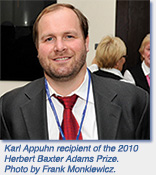 Herbert Baxter Adams Prize
Herbert Baxter Adams Prize
Karl Appuhn (New York Univ,) for A Forest on the Sea: Environmental Expertise in Renaissance Venice (Johns Hopkins University Press). Karl Appuhn’s deeply researched, cogently argued, and innovative study of Venetian forest management from the 14th through the 18th century is an outstanding piece of environmental history. His exploration of the complex development of Venice’s exploitation of unfamiliar inland woodlands for the timber that was so crucial to its fleets yields rich rewards for thinking about European state-building, exceptionalism, knowledge formation, economic development, and human interaction with nature over a longue durée.
George Louis Beer Prize
Holly Case (Cornell Univ.) for Between States: The Transylvanian Question and the European Idea during World War II (Stanford University Press). This book is a masterfully conceptualized, beautifully written, and rigorously researched exploration of nationalism, minority rights, and sovereignty. If the idea of Europe was largely imagined in the west; it was largely tested in the east. Far from being a “sideshow” to the drama of “Great Power” politics, the “Transylvanian Question” provides an often surprising introduction into the genealogy of the idea of the “question” in Europe’s nationality struggles in the bitter context of war.
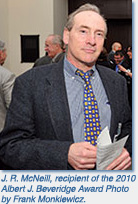 Albert J. Beveridge Award
Albert J. Beveridge Award
J. R. McNeill (Georgetown Univ.) for Mosquito Empires: Ecology and War in the Greater Caribbean, 1620–1914 (Cambridge University Press). This is a pathbreaking work in environmental history, the history of imperialism, and the history of the tropical Americas. McNeill demonstrates that the transformations caused by plantation agriculture and the Atlantic slave trade created ideal conditions for disease-bearing mosquitoes, tracing the development of conditions favorable to disease created by colonialism itself. Its extended chronology and transnational scope make Mosquito Empires an especially appropriate choice for the 2010 Beveridge Award.
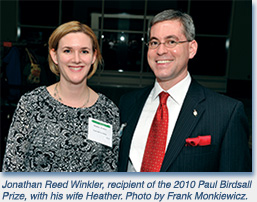 Paul Birdsall Prize
Paul Birdsall Prize
Jonathan Reed Winkler (Wright State Univ.) for Nexus: Strategic Communications and American Security in World War I (Harvard University Press). Winkler presents an intellectually imaginative and original history of strategic communications and its relationship to U.S. national security during the First World War. During this conflict the United States realized the importance of international communications to its political and economic interests. Winkler shows how technology factors interacted with more basic diplomatic concerns. This study is innovative in that it addresses a broad range of historiographical fields including diplomatic, military, intelligence, business, and technological history.
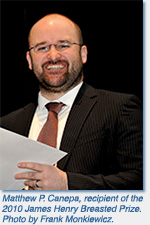 James Henry Breasted Prize
James Henry Breasted Prize
Matthew P. Canepa (Univ. of Minnesota, Twin Cities) for The Two Eyes of the Earth: Art and Ritual of Kingship between Rome and Sasanian Iran (University of California Press). Matthew Canepa has achieved an unusually effective piece of cross-cultural and interdisciplinary comparison. His deeply researched study demonstrates how Roman and Persian ideologies in late antiquity interacted, borrowed from one another, and were incorporated into their respective political and religious frameworks. Making those working on the Roman world more mindful of the reach and longevity of the Persian Empire, the book is a valuable reference tool and a model of emulation for premodern transnational studies.
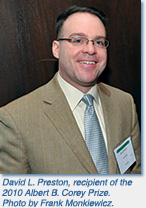 Albert B. Corey Prize
Albert B. Corey Prize
David L. Preston (The Citadel) for The Texture of Contact: European and Indian Settler Communities on the Frontiers of Iroquoia, 1667–1783 (University of Nebraska Press). Putting community relations at the heart of this clearly written, innovative study, David Preston analyzes intercultural contact among settlers—native and European—on the Iroquoian frontier. The quotidian challenges of daily chores and sociability testify to the mutual concerns and regard within these ethnically diverse communities. Preston then addresses the havoc wrought by imperial warfare, which forced people to choose sides, redefine property and landholding arrangements, and abandon the calibrated accommodations forged over previous decades.
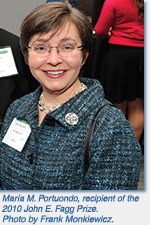 John Edwin Fagg Prize
John Edwin Fagg Prize
María M. Portuondo (Johns Hopkins Univ.) for Secret Science: Spanish Cosmography and the New World (University of Chicago Press). Secret Science is a fresh, deeply researched study of patronage culture, politics, and the production of knowledge in early Habsburg Spain that offers new insights into changing epistemologies shaped by New World discoveries. Changes were dramatic yet subtle as the cosmographers maneuvered around Aristotelian natural philosophy in favor of more mathematical methods without challenging Aristotelian premises; and the crown first guarded their writings as state secrets, and then began using them to celebrate Spain’s territorial claims and achievements.
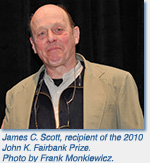 John K. Fairbank Prize in East Asian History
John K. Fairbank Prize in East Asian History
James C. Scott (Yale Univ.) for The Art of Not Being Governed: An Anarchist History of Upland Southeast Asia (Yale University Press). James Scott’s study of “Zomia,” the upland borders of southwest China and beyond, challenges standing interpretations of the region’s history by reconceptualizing local identity and state power. Not content to describe the impact of imperial expansion in these geographic and cultural spaces in-between, Scott provocatively theorizes the implications of these “shatter zones” for the empires that encroached on them. He illuminates the historical contours of Zomia, revealing unexplored veins of human cultural and political experience.
Morris D. Forkosch Prize
Steve Pincus (Yale Univ.), for 1688: The First Modern Revolution (Yale University Press). Using an astonishing range of archival material, Steve Pincus has produced an account of the Glorious Revolution that will transform not only the way we think about that event, but also about revolutions and modernization generally. Approaching 1688 transnationally and looking through a wide chronological lens, he reveals not an “unrevolutionary revolution” but a choice between two radical visions for England’s future. Pincus’s engaging prose makes this a book for all lovers of great historical writing.
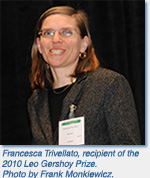 Leo Gershoy Award
Leo Gershoy Award
Francesca Trivellato (Yale Univ.) for The Familiarity of Strangers: The Sephardic Diaspora, Livorno, and Cross-Cultural Trade in the Early Modern Period (Yale University Press). Combining painstaking research with an innovative theoretical approach, Trivellato traces the lives of Jewish merchants in early modern Livorno, as they conducted business at home and abroad. Trivellato’s nuanced approach reveals her subjects as both bound by and able to transcend social, cultural, and geographical barriers. But Trivellato’s narrative is entirely unbounded, and effortlessly traverses the fields of cultural, Jewish, social, business, and global history with an intrepid energy that mirrors that of her subjects.
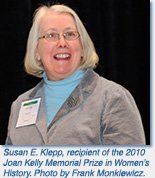 Joan Kelly Memorial Prize in Women’s History
Joan Kelly Memorial Prize in Women’s History
Susan E. Klepp (Temple Univ.) for Revolutionary Conceptions: Women, Fertility, and Family Limitation in America, 1760–1820 (Published for the Omohundro Institute of Early American History and Culture by University. of North Carolina Press). Susan Klepp’s Revolutionary Conceptions is a highly readable, theoretically sophisticated work that transforms the historical understanding of the so-called “fertility transition.” Using a vast array of sources, Klepp uncovers a variety of non-barrier birth control methods used by women to influence the number and timing of children they bore. Women’s assertion of control over their own bodies, Klepp demonstrates, represented nothing less than an American Revolution for women.
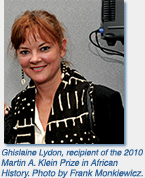 Martin A. Klein Prize in African History
Martin A. Klein Prize in African History
Ghislaine Lydon (UCLA) for On Trans-Saharan Trails: Islamic Law, Trade Networks, and Cross-Cultural Exchange in Nineteenth-Century Western Africa (Cambridge University Press). Lydon’s elegantly written book overturns received historiography by encompassing Sudanic and North Africa, while challenging associated notions of identity characterized by race. Based on exhaustive archival research and some 200 interviews, this transnational gendered study engages multiple historiographies to reveal the intricate multilingual history of how the trans-Saharan trade operated. Lydon’s curiosity, respect for her subjects, and meticulous reading of her sources make this book a model for all historians.
Littleton-Griswold Prize
Catherine L. Fisk (Univ. of California at Irvine) for Working Knowledge: Employee Innovation and the Rise of Corporate Intellectual Property, 1800–1930 (University of North Carolina Press)
Lisa Ford (Univ. of New South Wales) for Settler Sovereignty: Jurisdiction and Indigenous People in America and Australia, 1788–1836 (Harvard University Press)
Reflecting the breadth and depth of the field of legal history, the co-winners demonstrate what deep archival research combined with insightful and nuanced interpretations can accomplish. Catherine Fisk’s work analyzes effortlessly intellectual property, labor relations, and business practices, over a broad span of time. Lisa Ford’s book explores persuasively how local elites and actors, in different yet surprisingly legally similar places, employed local lawmaking and the slippery concept of sovereignty to their own advantages.
J. Russell Major Prize
Stuart Carroll (Univ. of York) Martyrs and Murderers: The Guise Family and the Making of Europe (Oxford University Press) for In Martyrs and Murderers, Stuart Carroll has crafted a masterful reinterpretation of the Guise family’s role in France and Europe in the era of the wars of religion. Carroll demolishes the black legend of the Guise as power-hungry conspirators, offering instead a richly detailed study of their contributions to the high politics of church and state in an age when the values of civilization, honor, and self-discipline were linked to the threat of terrible violence.
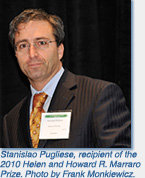 Helen and Howard R. Marraro Prize
Helen and Howard R. Marraro Prize
Stanislao Pugliese (Hofstra Univ.) for Bitter Spring: A Life of Ignazio Silone (Farrar, Straus and Giroux). This biography of political activist turned writer Ignazio Silone beautifully weaves together intellectual, literary, personal, and political history. Against the backdrop of the ideological struggles that shook Italy in the 20th century, Pugliese creatively challenges the confines of traditional biography. He traces Silone’s trajectory from leader of the Italian Communist Party to vocal anti-communist and the meanings and interpretations of “il caso Silone,” giving us Silone and his legacy in their complexity for the first time.
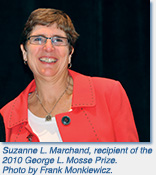 George L. Mosse Prize
George L. Mosse Prize
Suzanne L. Marchand (Louisiana State Univ.) for German Orientalism in the Age of Empire (Cambridge University Press and the German Historical Institute). In her wide-ranging study, Suzanne Marchand sets German Orientalism into the long history of European scholarship since the Renaissance. She masterfully unfolds the complex theological, political, and intellectual conflicts that drove the German academic encounter with the East. In doing so, she produces a richly contextualized and documented study of a field that dominated German intellectual life for the better part of a century.
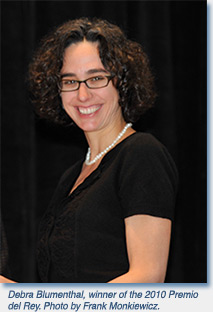 Premio del Rey
Premio del Rey
Debra Blumenthal (Univ. of California at Santa Barbara) for Enemies and Familiars: Slavery and Mastery in Fifteenth-Century Valencia (Cornell University Press). Fifteenth-century Valencia was peopled by Tartars, Russians, Africans, and Canary Islanders, as well as by indigenous Christians, Muslims, and Jews: a fascinating laboratory for Blumenthal’s exploration of European slavery on the eve of colonization. She uncovers a society poised between the Mediterranean and Atlantic, between ideologies of slavery legitimated by religion and those legitimated by race, between slaves’ agency and their masters, and between “family” and “property” as paradigms for thinking about power within the household.
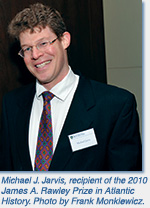 James A. Rawley Prize in Atlantic History
James A. Rawley Prize in Atlantic History
Michael J. Jarvis (Univ. of Rochester) for In the Eye of All Trade: Bermuda, Bermudians, and the Maritime Atlantic World, 1680–1683 (Published for the Omohundro Institute of Early American History and Culture by University of North Carolina Press). Michael Jarvis’ book represents Atlantic history at its best. It not only brings to life the far-flung worlds of Bermuda’s free and enslaved seafaring men and their families, but also sheds light on hitherto unexplored corners of the British Atlantic, illuminating the many, and at times unexpected, ties of empire. The product of prodigious research, the book is a compelling and exceptionally informative read.
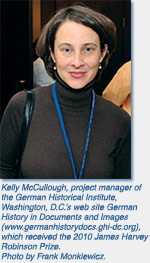 James Harvey Robinson Prize
James Harvey Robinson Prize
German History in Documents and Images (www.germanhistorydocs.ghi-dc.org), produced by the German Historical Institute, Washington, D.C. This web site should serve as a model for other primary source web sites. Accessible and easy to navigate, it is outstanding in the clarity of its design and organization. The combination of narrative overviews, beautifully drawn maps, stunning images, and provocative source documents in both German and English makes this an eminently flexible teaching tool. Engaging and exciting, this free web site is truly a gift both to students and instructors.
 Wesley-Logan Prize
Wesley-Logan Prize
Pier M. Larson (Johns Hopkins Univ.) for Ocean of Letters: Language and Creolization in an Indian Ocean Diaspora (Cambridge University Press). A study of Malagasy language as a vehicle to examine a range of social, cultural, political, and economic interactions and a lens to unravel the complexities of Malagasy identity-making from the Madagascar homeland, to Mauritius, to South Africa, to the Comores. Striking connections to the Atlantic world include experiences with European colonialism, religious transformation, slavery and apprenticeship, creolization, and literacy. Larson’s work is one of the most evocative renderings of the African diaspora in the Indian Ocean yet written.
Sharon K. Tune is the AHA’s convention director, and assistant director, administration.
Check out more photos of the 125th annual meeting at the AHA's Facebook page: www.facebook.com/AHAhistorians.
Tags: Annual Meeting Member News
Comment
Please read our commenting and letters policy before submitting.






